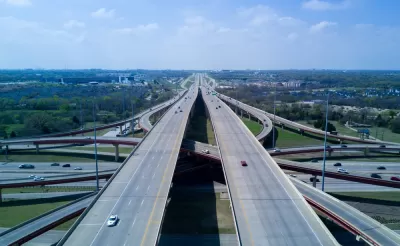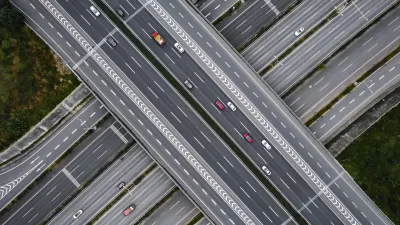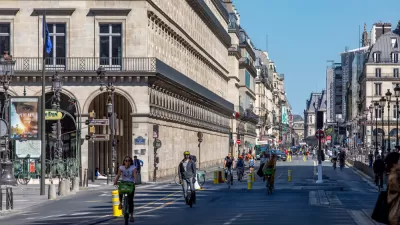Banning cars will not be effective as long as U.S. cities continue to prioritize transportation systems where mobility is dependent on driving.

Culdesac Tempe is a new Arizona development where cars will be banned—a strategy to encourage less driving, but one that does not address the broader issues, writes Joseph W. Kane. "Rather than focusing on an outright ban on cars, we need to make it easier for more people to live in places where shorter trips are the norm, and driving across an inefficient and inequitable built environment isn’t always necessary."
Culdesac Tempe’s vision is commendable, says Kane, but sustainability within the development will not change the fact that people still need to drive to get to work, shopping, school, and other destinations in the metropolitan Phoenix area.
Transportation systems too often privilege cars, and the car-centric landscapes of many American cities are reflected in trends in recent years such as the increase in vehicle numbers and vehicle miles traveled.
Kane suggests that the United States look abroad for examples of effective policies and design measures that foster density, decrease driving, and offer a range of transportation options. "European cities stand out here, from Barcelona’s 'superblocks' planning effort, to Ghent’s pedestrian zone, to Copenhagen’s bicycle highways."
But some cities in the United States have also implemented strategies that are making a difference, notes Kane, including pedestrian-friendly neighborhood design, parking minimums, and congestion charges. "These efforts encourage people to drive less, while incentivizing the creation of more walkable, livable communities."
FULL STORY: Banning cars won’t solve America’s bigger transportation problem: Long trips

Alabama: Trump Terminates Settlements for Black Communities Harmed By Raw Sewage
Trump deemed the landmark civil rights agreement “illegal DEI and environmental justice policy.”

Study: Maui’s Plan to Convert Vacation Rentals to Long-Term Housing Could Cause Nearly $1 Billion Economic Loss
The plan would reduce visitor accommodation by 25% resulting in 1,900 jobs lost.

Planetizen Federal Action Tracker
A weekly monitor of how Trump’s orders and actions are impacting planners and planning in America.

Wind Energy on the Rise Despite Federal Policy Reversal
The Trump administration is revoking federal support for renewable energy, but demand for new projects continues unabated.

Passengers Flock to Caltrain After Electrification
The new electric trains are running faster and more reliably, leading to strong ridership growth on the Bay Area rail system.

Texas Churches Rally Behind ‘Yes in God’s Back Yard’ Legislation
Religious leaders want the state to reduce zoning regulations to streamline leasing church-owned land to housing developers.
Urban Design for Planners 1: Software Tools
This six-course series explores essential urban design concepts using open source software and equips planners with the tools they need to participate fully in the urban design process.
Planning for Universal Design
Learn the tools for implementing Universal Design in planning regulations.
Caltrans
Smith Gee Studio
Institute for Housing and Urban Development Studies (IHS)
City of Grandview
Harvard GSD Executive Education
Toledo-Lucas County Plan Commissions
Salt Lake City
NYU Wagner Graduate School of Public Service





























